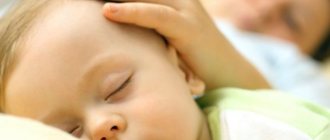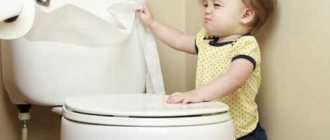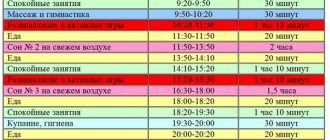Children under one year of age often experience increased activity of the salivary glands. This can be caused by various reasons: from teething to acute respiratory disease. The main thing is to correctly determine the cause of this condition. In most cases, this problem does not require treatment and goes away on its own.
Baby drooling is a common occurrence.
Causes of increased salivation at night
If a child chokes on saliva in his sleep, he should be moved from a position lying on his back to his side or stomach, then the mucus will not flow into the lungs, causing a cough. The problem is worse at night because:
- The baby lies on his back;
- The child does not move for a long time;
- Mucus drains into the lungs along the back of the throat;
- At night, the activity of the salivary glands increases.
This condition should not be considered a pathology; it is normal in children under one year of age.
The most common reason for the active formation of saliva is teething. Also, the volume of mucus secreted increases sharply when a child suffers from acute respiratory infections and acute respiratory viral infections. When the period of recovery begins, this condition passes. The baby begins to choke on saliva because mucus from the mouth constantly gets into the throat, and the baby does not have time to spit it out.
The most likely cause of the problem is active teething
How to determine the exact cause
If parents cannot immediately understand why the child is choking on saliva, they should take a closer look at the general well-being and behavior of the baby. The easiest way to determine the presence of acute respiratory infections.
The main symptoms include:
- Runny nose.
- Cough.
- Temperature increase.
It is important not to confuse a cold with allergic rhinitis. If a child's nose is clogged with mucus for a month, treatment for respiratory diseases does not help, and a large amount of saliva constantly accumulates in the mouth - these are signs of an allergy.
Stomatitis manifests itself in the form of rashes on the tongue and gums, so it is not difficult to notice. Gastrointestinal diseases can only be determined by a pediatrician, as well as a violation of the swallowing reflex. Therefore, if you cannot independently determine the reason why a child is choking on saliva, you should immediately consult a doctor.
Emergency help for choking on saliva
Parents often wonder whether a baby can choke on saliva and why this happens. This is really possible if the baby sleeps in a supine position. Also, a sleeping baby may choke when burping. To prevent this from happening, after feeding you should keep the baby in an upright position for about 15 minutes and only then put it in the crib.
At what age can you give your baby milk?
Emergency help may be needed if:
- The mucus is thick and viscous, and the child cannot spit it out on his own;
- The baby's nose is very clogged due to a runny nose;
- Salivation is caused by ingestion or inhalation of a foreign body;
- The child suddenly found it difficult to breathe.
In these cases, parents must act correctly so as not to harm the baby.
If a baby chokes
If parents see that the child is choking on saliva, they need to give the baby an upright position as soon as possible. A baby after six months who can sit can be placed on pillows to sleep in this position; Children up to two to three months are placed on their stomach. If the baby cannot breathe, you need to take him by the legs, turn him head down and hold him in this position until he spits out mucus or a foreign body. This must be done quickly.
What not to do
When a child is choking and cannot clear his throat, parents should not be nervous, because anxiety always interferes with the correct action. Also, you should not slap the baby sharply on the back - this can push the mucus even further into the respiratory tract. If the baby screams loudly, you should not interfere with this - with a scream, he can get rid of the abundance of saliva on his own. If there is increased salivation, the baby cannot be limited in liquid; on the contrary, he should drink as much as possible. Acidic drinks (for example, cranberry juice) should be avoided - they provoke excessive saliva production.
Attention! You should not give your baby bagels or dryers instead of a teether. The baby may bite off a small piece and choke. All rattles with small parts inside that the baby takes into his mouth must be securely closed.
First aid must be provided quickly and correctly
What not to do
Cases when a child chokes or chokes on food occur quite often. When a baby is teething, he can bite off a fairly large piece of food. If he cries or laughs at this second, he may choke. While exploring the world around them, children put everything into their mouths, and not always edible objects.
The most important thing parents should do is remain calm. The mother's fear is instantly transmitted to the child. If he gets scared, his condition will worsen.
If your baby coughs, it means he doesn’t need help. He can clear his throat on his own. It is enough to be nearby and comfort.
But if an object gets into the respiratory tract, then under no circumstances should you forcefully slap the child on the back if the child is standing or sitting. Because of this, the piece may fall even deeper. You need to lay the baby down so that the head and back are tilted. You cannot remove the item yourself; immediate medical attention is required. It is necessary to provide first aid to the baby using a special method.
When you need a doctor's help
How to tell if a newborn has a fever
If a child chokes on saliva in his sleep due to a runny nose, the snot flows down his throat and interferes with sleep. In this case, you should contact your pediatrician to prescribe antiviral drugs and vasoconstrictor nasal drops. You also need medical help if:
- The child has a red and swollen throat (this may be a sign of infection);
- Small ulcers are visible in the mouth, longitudinal grooves are visible on the tongue (a characteristic sign of stomatitis);
- In addition to salivation, severe cough and high fever are observed;
- Children's teeth erupt in the wrong order.
Typically, an infant begins a period of active drooling after six months, when the first milk teeth erupt. However, in some cases this time begins much earlier - at three to four months. In this case, it is necessary to bring your baby to the doctor, since premature appearance of teeth may indicate rickets and other diseases.
To alleviate the condition, you can give your baby a special children's toy - a teether. When a newborn girl or boy chews or sucks such a rattle, the child gets rid of excess drool and pain in the gums, and therefore begins to feel better.
When the toddler turns one year old, the activity of the baby's salivary glands gradually slows down, but periodically resumes during the appearance of new pairs of milk teeth. At this time (up to 2.5 years), you should be especially attentive to the health and well-being of the baby and make sure that he does not suffocate from increased salivation during sleep.
Help the baby
The main rule for parents is to prevent their child from choking. If there is increased salivation during sleep, you can place an anatomical pillow under the head or put the baby to sleep on his side so that the baby does not choke. If this happens while eating or playing, you need to help him take an upright position and clear his throat. To protect your facial skin from irritation, you can use baby cream and blot excess saliva with a napkin. You can make the teething process easier with the help of special massagers, “rodents.”
Another option for why a child is choking on saliva may be the presence of a foreign object in the mouth or respiratory system. It is important not to let your baby play with small toys that are easy to swallow. If such a thing gets into your mouth, the amount of saliva released will increase sharply. This may be a signal to parents. If such a change is noticed in time, then swallowing the toy can be prevented. Otherwise, a visit to a doctor is indicated.
Possible consequences and complications
What are the types of boogers in a baby's nose - the main types
Situations when a child chokes on saliva are most often characteristic of acute respiratory diseases and the period of teething. There are usually no complications; any baby can choke or choke slightly, it’s not scary.
However, if a child chokes on mucus from a runny nose and finds it difficult to breathe, self-medication or improper treatment can lead to bronchitis (pneumonia). In this case, treatment with antibiotics will be required. If your baby starts coughing, you need to pay attention to this.
Constant contact of saliva on the chin of a newborn can lead to skin irritation: redness, itching, and discomfort. In this case, it is recommended to lubricate the affected area with any moisturizing baby cream containing panthenol. Also, do not rub irritated skin with a towel. If your baby begins to drool a lot, you can only gently blot it with soft cotton pads or a microfiber cloth.
Increased activity of the salivary glands is not a disease, but a normal physiological condition
First aid
What to do if, after all, the child chokes on saliva and begins to choke:
- Clearing the airways. Place the baby with his back to himself, wrap his arms around him and press sharply, but not too much, in the stomach area. Then, leaning forward a little, lightly spank between the shoulder blades with your palm.
- Clearing saliva while lying down. The baby is placed on his back, with his body higher than his head. Using two fingers, index and middle, make 4-5 compressions on the chest. After each pressure, the chest should straighten completely. Do not use force so as not to harm the baby.
Ways to free a child’s airways from excess saliva and snot.
After such procedures, allow the baby to cough. Breathing should level out and wheezing should go away.
If a child is choking and choking on snot:
- Buy a nozzle ejector at the pharmacy. A pear-shaped device will be useless because it will not be able to cope with thick mucus.
- Stock up on saline or other saline liquid. You can purchase a special salt spray for children.
- Prepare vasoconstrictor drops for the nasal cavity. Required only for infectious diseases.
Let's start the cleansing process:
- It is important to secure the child in a lying position on his back; you can swaddle him tightly.
- Inject saline solution into one nostril and immediately suction it out with an aspirator.
- Do the same for the second nostril.
- Repeat the procedure 2-3 times for each nasal passage until you see that the mucus has become thinner or is absent altogether.
- Apply vasoconstrictor drops according to the instructions. They will prevent infection from entering the inner ear. Any medications other than saline solution are allowed to be used only as prescribed by a pediatrician.
- On the third day, the mucus usually becomes less thick and will flow out of the nose on its own.
- Washing with saline solution should be carried out 3-5 times a day, depending on the child’s condition.
In any case, your actions will lead to tears and screams of the baby. You should not stop the procedure, because the presence of a large amount of snot in the nasal cavity can cause complications.
If the mucus is very viscous and it was not possible to get it out, then the right solution is to go to the ENT specialist.
Doctor Komarovsky's opinion
Komarovsky believes that cough due to strong salivation is most often caused by the appearance of teeth; this condition does not require treatment. Even a healthy child must cough sometimes to clear the nasopharynx of saliva and mucus. However, if the baby begins to choke, urgent medical attention is needed; self-medication is dangerous.
Attention! If during the period of teething the temperature rises above 38.5 degrees, most likely we can talk about an infection. This happens quite often, because during this period the child’s body becomes especially vulnerable.
The child’s body is particularly vulnerable and increased susceptibility to medications, so it is strictly forbidden to give the baby any medications without prior approval from the attending physician. The dosage should be appropriate to the age and (or) weight of the baby.
Video
21009, Anti-colic gel heating pad with Happy Baby Velcro cover, olive
824 ₽ More details
21009, Anti-colic gel heating pad with Happy Baby Velcro cover, lilac
824 ₽ More details
Strollers Happy Baby











